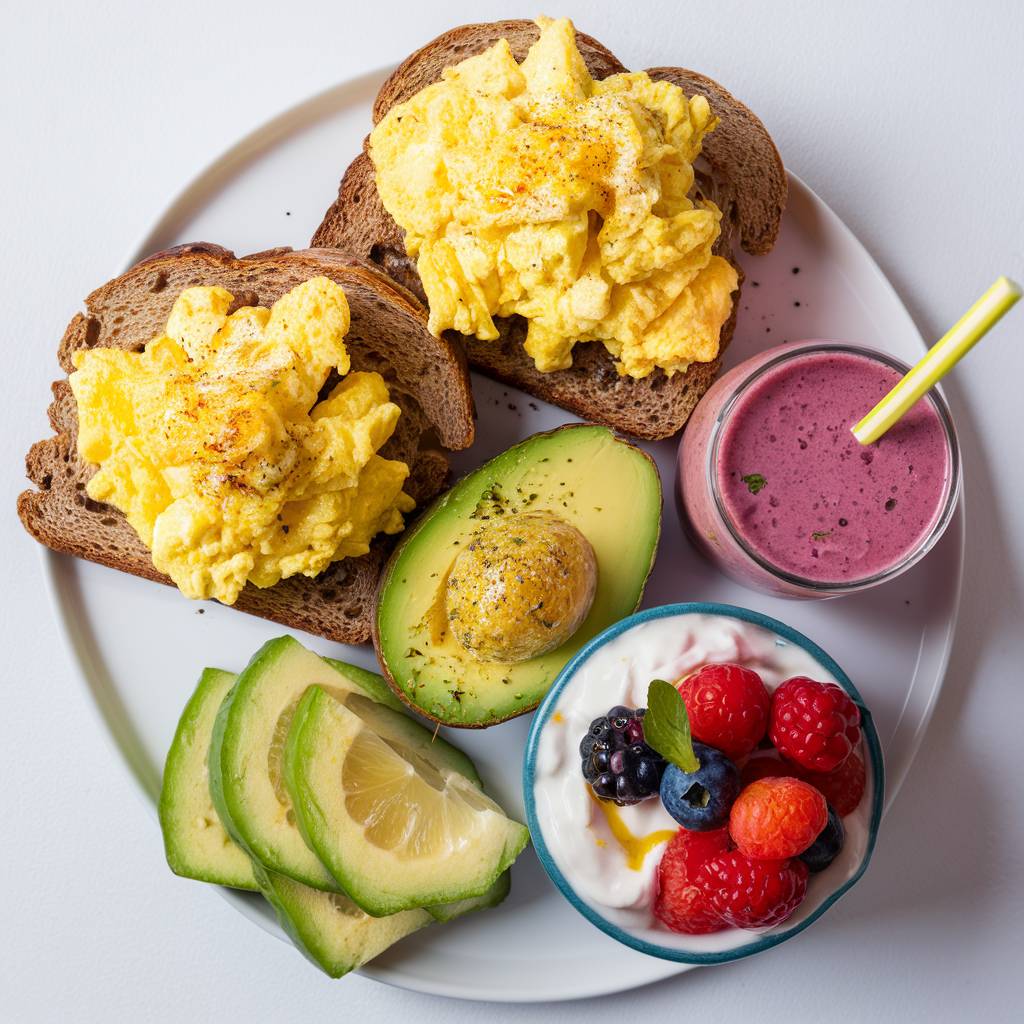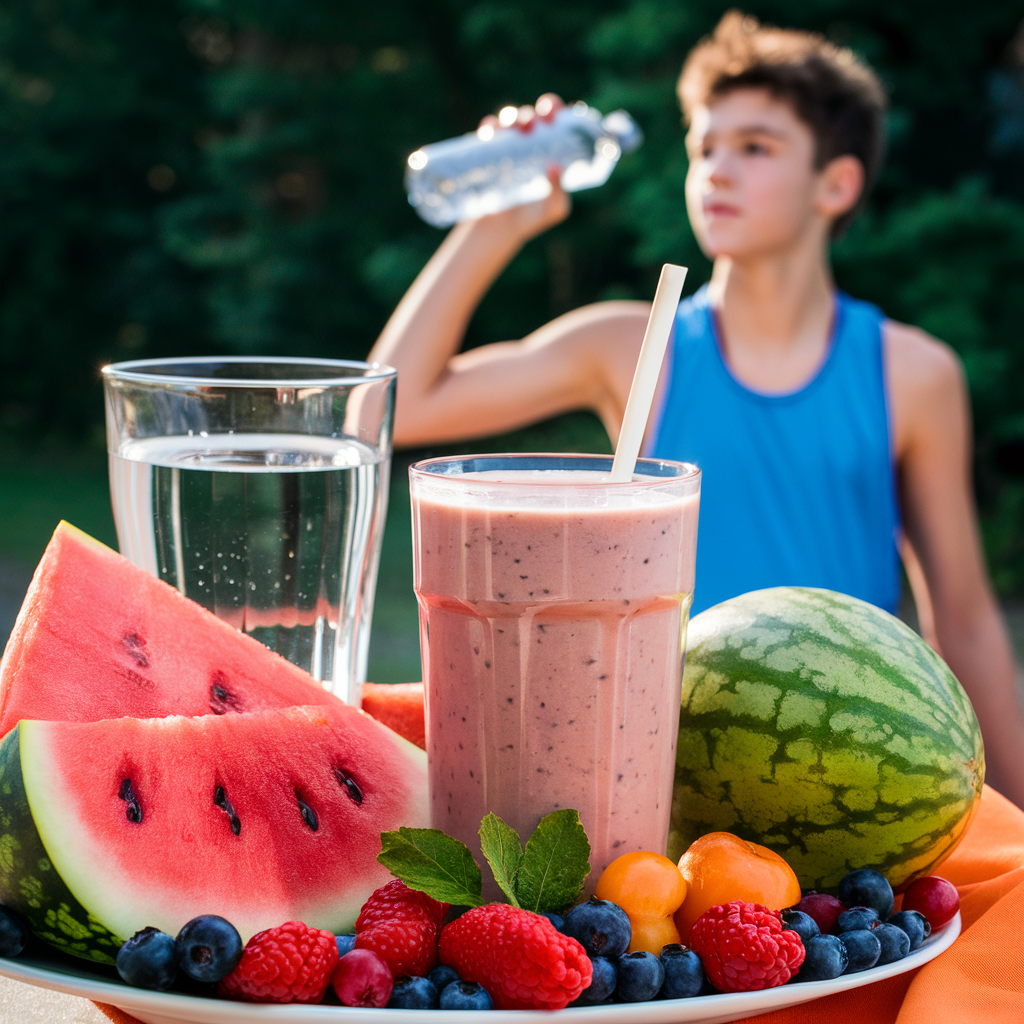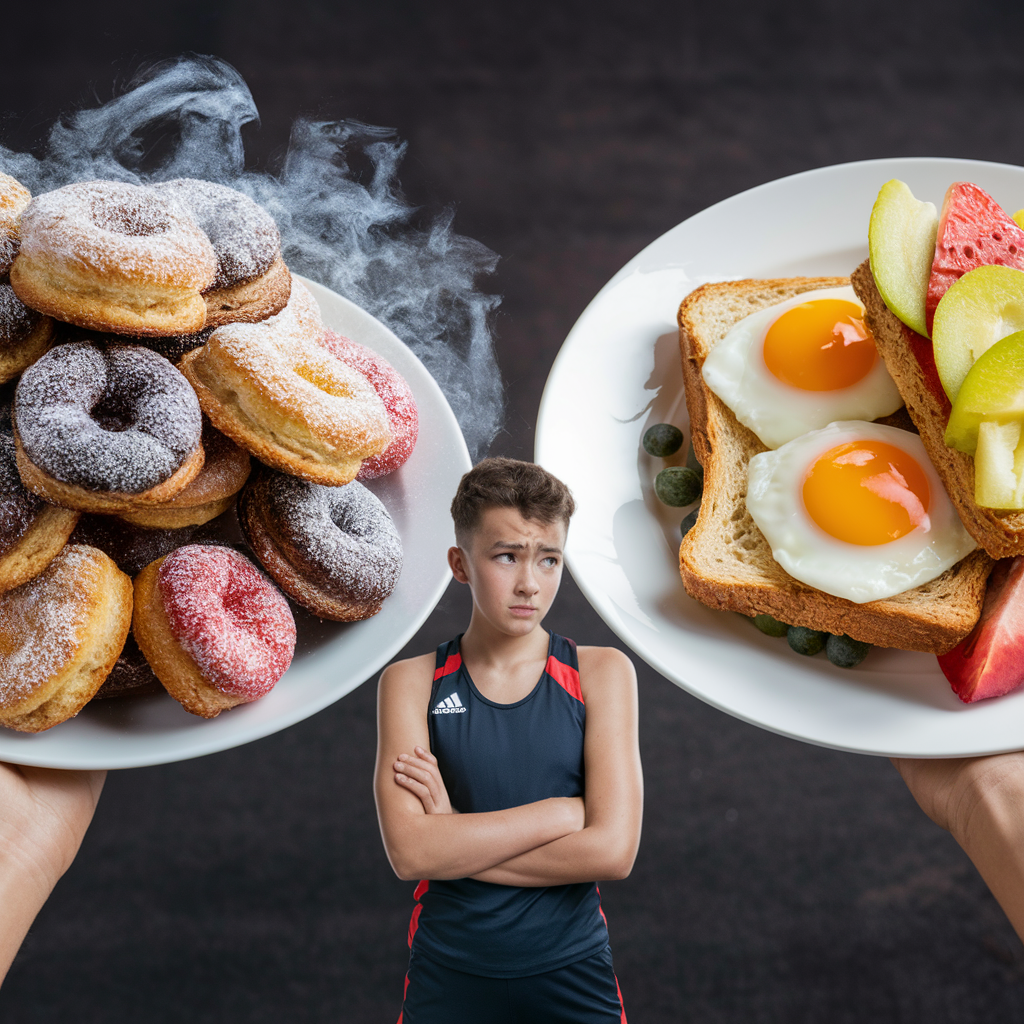Table of Contents
Introduction

For teen athletes, breakfast isn’t just another meal—it’s a critical part of their day. With early practices, packed school schedules, and evening games, the right morning fuel can mean the difference between excelling on the field and falling short. A well-balanced breakfast provides the energy to power through training sessions, aids in recovery, and supports overall health.
Athletic teens have unique nutritional needs. They require more calories, protein, and micronutrients than their less-active peers. Unfortunately, many skip breakfast or opt for sugary cereals that don’t offer the sustained energy they need. This guide highlights the importance of a healthy breakfast, breaks down essential nutrients, and offers practical meal ideas tailored to busy schedules.
The Importance of a Healthy Breakfast for Teen Athletes
Skipping breakfast can leave teen athletes feeling sluggish, affecting both their academic and athletic performance. A healthy breakfast not only fuels the body but also helps:
- Replenish glycogen stores after overnight fasting.
- Improve focus and reaction times during practice and classes.
- Set a positive tone for healthy eating throughout the da
Why Breakfast is Critical for Athletic Performance
How Breakfast Fuels the Body
Breakfast is often referred to as the most important meal of the day, and for good reason. After a night of fasting, the body’s glycogen stores are depleted. For athletes, glycogen serves as the primary fuel for high-intensity activities like running, jumping, and weightlifting. Therefore, a nutrient-rich breakfast helps restore these energy levels, ensuring teen athletes perform at their best from the start of the day.
Key benefits include:
- Increased stamina: Carbohydrates in breakfast replenish glycogen stores, providing sustained energy for morning practices and competitions.
- Improved mental focus: A steady supply of glucose enhances concentration and decision-making skills, which are crucial for both academics and sports.
- Faster recovery: Protein-rich breakfasts aid in muscle repair and reduce the risk of injuries, making it easier for athletes to recover after intense sessions.
Long-Term Benefits for Teen Athletes
Building a routine of eating a healthy breakfast can lead to long-term gains:
- Better body composition: Maintaining an optimal balance of lean muscle and fat, which directly supports performance.
- Enhanced metabolism: Breakfast kickstarts the metabolic processes, which is especially important for growing athletes.
- Positive eating habits: Encourages mindful food choices throughout the day, reducing the likelihood of unhealthy snacking.
Moreover, teens who consistently eat breakfast often report feeling more energetic and alert throughout the day, both in their studies and during practices.
Key Nutritional Components of a Healthy Breakfast
Carbohydrates for Energy
Carbs are the primary energy source for athletes. Without them, the body struggles to perform well during physical activity. Opt for complex carbohydrates, which are digested slowly, providing sustained energy throughout the morning. Examples include:
- Whole-grain bread
- Oats
- Sweet potatoes
On the other hand, simple carbs like fruits are excellent for a quick energy boost and are easy to digest, especially before practices or games.
Protein for Muscle Repair
Protein is crucial for muscle growth and repair. Including a protein source in breakfast can help prevent muscle breakdown during training. For example, eggs can be boiled, scrambled, or included in an omelet to create a balanced meal. Other excellent options include:
- Greek yogurt for a creamy and versatile base in parfaits.
- Lean meats like turkey or chicken, which are filling yet low in fat.
- Plant-based proteins, such as tofu or nuts, which are perfect for vegetarians.
By combining protein with carbs, athletes can enhance both recovery and energy replenishment.
Healthy Fats for Endurance
Fats are an excellent secondary energy source for athletes. Unlike carbohydrates, fats provide long-lasting fuel, especially for endurance sports. Consider incorporating fats from:
- Avocados, which can be spread on toast for a quick breakfast.
- Nut butters, which pair well with whole-grain bread or fruits like bananas.
- Seeds like chia and flax, which can be sprinkled on oatmeal or smoothies.
In addition to fueling the body, healthy fats also support brain health, which is essential for focus and decision-making.
Vitamins and Minerals for Recovery
Micronutrients play a vital role in athletic performance. For instance:
- Calcium supports strong bones and muscle function, and it can be found in dairy products and fortified plant-based milk.
- Iron helps transport oxygen in the blood, making it indispensable for endurance. Foods like spinach, beans, and lean meats are rich in iron.
- Vitamin C boosts immune health and aids in recovery, which is particularly important during periods of intense training. Citrus fruits, bell peppers, and strawberries are excellent sources.
By including colorful fruits and vegetables in their breakfast, athletes can ensure they get a wide range of these essential nutrients.
Top Healthy Breakfast Ideas for Teen Athletes
Crafting the perfect breakfast for teen athletes doesn’t have to be complicated. The key is to strike a balance between macronutrients while creating meals that are quick, satisfying, and energizing. Below are several breakfast ideas tailored to meet the unique demands of active teens.
Quick and Balanced Options
Teen athletes often face tight schedules, especially during school days or early morning practices. Therefore, grab-and-go breakfasts are ideal because they provide essential nutrients without requiring much time. For instance:
- Hard-boiled eggs with a piece of fruit: This combination delivers a mix of protein, healthy fats, and natural sugars, ensuring sustained energy.
- Greek yogurt parfait: Layer Greek yogurt, granola, and berries for a protein-packed breakfast with a touch of sweetness. Additionally, you can prepare it the night before to save time in the morning.
- Whole-grain toast with almond butter: Add banana slices for extra energy and potassium, which are crucial for muscle function.
- Overnight oats: Mix oats with milk, chia seeds, and your choice of fruit the night before. Not only is this meal effortless, but it’s also highly customizable.
These options are not only easy to prepare but also portable, which means teens can enjoy them on their way to school or practice.
High-Protein Breakfasts
Protein is critical for athletes who need to repair and build muscle. Moreover, it keeps athletes feeling full longer, preventing mid-morning hunger pangs. The following ideas emphasize high-protein ingredients:
- Egg and veggie scramble: Combine scrambled eggs with spinach, tomatoes, and bell peppers for a colorful, protein-packed start. Additionally, the veggies provide valuable vitamins and fiber.
- Protein smoothies: Blend protein powder with milk, spinach, frozen berries, and a spoonful of peanut butter for a quick and nutritious drink. For variety, you can swap the peanut butter with almond butter or use different fruits.
- Cottage cheese with fruit: Pair cottage cheese with sliced peaches or pineapple for a sweet and savory meal. This option is perfect when you’re short on time but still need a protein boost.
- Turkey or chicken breakfast wrap: Wrap lean meat, scrambled eggs, and avocado in a whole-grain tortilla for a satisfying handheld option. Not only is it filling, but it also provides a balance of protein and carbs.
By including protein-rich foods at breakfast, athletes can support muscle recovery and improve their overall strength.
Carb-Focused Meals for Game Days
On game days, carbohydrates take center stage, as they are the primary fuel for high-intensity activities. To ensure peak performance, it’s essential to focus on meals that prioritize carbs. Here are some carb-centric breakfast ideas:
- Oatmeal with banana and honey: This combination offers complex carbs from oats and a quick energy boost from natural sugars. Additionally, the potassium in bananas helps prevent muscle cramps.
- Whole-grain waffles with berries and maple syrup: A balanced mix of carbs and antioxidants, this option is ideal for pre-game fuel. If possible, use real maple syrup for a natural source of sweetness.
- Bagel with cream cheese and smoked salmon: Provides a blend of carbs, protein, and omega-3 fatty acids, which help reduce inflammation. This breakfast is perfect for athletes who want something hearty but easy to digest.
- Breakfast burrito: Fill a tortilla with scrambled eggs, black beans, and a sprinkle of cheese for a hearty, carb-rich option. Additionally, the beans provide fiber, which supports digestive health.
These meals ensure that teen athletes have the sustained energy they need to perform their best during competitions.
Plant-Based and Allergen-Free Choices
For athletes with dietary restrictions or allergies, there are plenty of nutritious breakfast options to explore. Even though these meals avoid common allergens, they still deliver essential nutrients. Consider the following ideas:
- Chia seed pudding: Combine chia seeds with almond milk, a touch of vanilla, and fresh fruit for a creamy, dairy-free alternative. Furthermore, this dish is rich in omega-3 fatty acids, which support brain health.
- Tofu scramble: Sauté tofu with turmeric, vegetables, and nutritional yeast for a protein-rich, plant-based meal. For added flavor, sprinkle on some herbs or spices.
- Gluten-free avocado toast: Use gluten-free bread topped with mashed avocado, sea salt, and a sprinkle of sesame seeds. For extra protein, add a poached egg on top.
- Smoothie bowl: Blend frozen fruits, plant-based protein powder, and coconut milk, then top with nuts and granola. This option is not only vibrant and appealing but also packed with antioxidants.
These meals cater to specific dietary needs while still delivering the essential nutrients required for athletic performance.
Meal Prep Tips for Busy Teen Athletes
Teen athletes often juggle early practices, schoolwork, and evening games, making meal prep a game-changer for maintaining a healthy diet. With a little planning, it becomes easier to consistently provide nutritious breakfasts.
Planning Ahead for Success
Meal prep starts with creating a plan. First, outline the week’s schedule and identify the days when time is limited. For example, if mornings are rushed, focus on make-ahead options like overnight oats or egg muffins. Similarly, batch cooking items like pancakes or breakfast burritos can save time throughout the week.
Additionally, organizing ingredients in advance simplifies the process. For instance, portion out toppings like granola, nuts, or fruit in containers so they’re ready to grab.
Portable Breakfast Ideas
For mornings when eating at home isn’t an option, portable meals are a lifesaver. Here are some ideas:
- Breakfast wraps: Fill whole-grain tortillas with scrambled eggs and veggies. Wrap them in foil for an easy, on-the-go option.
- Energy bites: Combine oats, nut butter, honey, and chia seeds into bite-sized balls. These are great for eating on the run.
- Smoothies in jars: Prepare smoothies the night before, store them in mason jars, and grab them on the way out the door.
Incorporating Variety to Prevent Monotony
Even the healthiest breakfast can feel boring if eaten daily. To keep things interesting, rotate ingredients and try different recipes each week. For example, one week, focus on oatmeal variations with different toppings. The next, switch to breakfast wraps or smoothie bowls. By doing so, athletes stay motivated to eat healthy without feeling stuck in a routine.
Hydration and Breakfast

Hydration is often overlooked at breakfast, but it plays a significant role in athletic performance. After hours of sleep, the body is naturally dehydrated. Therefore, starting the day with fluids is essential.
The Role of Hydration in Athletic Performance
Even mild dehydration can negatively impact an athlete’s endurance, focus, and recovery. Drinking water first thing in the morning helps replenish fluid levels. Furthermore, pairing breakfast with hydrating foods like fruits or smoothies can make staying hydrated even easier.
Best Morning Beverages for Athletes
When it comes to beverages, water is always a top choice. However, other drinks can also complement breakfast:
- Milk: A good source of protein, calcium, and vitamins.
- Smoothies: Packed with nutrients, they double as both food and hydration.
- Electrolyte-infused water: On practice or game days, adding electrolytes can help maintain optimal hydration levels.
- Green tea: For older teens, green tea provides antioxidants and a light caffeine boost without the jitters of coffee.
Avoid sugary drinks, as they can cause energy crashes later in the day.
Common Mistakes to Avoid with Breakfast

Despite their best intentions, many athletes make common breakfast mistakes that hinder performance. Recognizing and avoiding these errors is crucial.
Skipping Breakfast
Some athletes skip breakfast due to a lack of time or appetite in the morning. Unfortunately, this leads to low energy levels, reduced focus, and a greater likelihood of fatigue during training. To combat this, focus on light, easy-to-digest options like a smoothie or yogurt parfait.
Overloading on Sugary Foods
While sugar provides a quick energy boost, overloading on sugary cereals or pastries causes blood sugar levels to spike and crash. Instead, pair natural sugars from fruits with protein and fiber to sustain energy levels.
Ignoring Post-Practice Nutrition
Morning practices can deplete an athlete’s energy reserves. Skipping a post-practice breakfast leads to slower recovery and reduced performance later in the day. To address this, plan a balanced meal with carbs and protein, such as a turkey sandwich or oatmeal with peanut butter.
FAQs About Healthy Breakfasts for Teen Athletes
1. What are quick breakfast ideas for teens with early practices?
Teens with early practices need breakfasts that are both nutritious and easy to prepare. Options like overnight oats, protein smoothies, or hard-boiled eggs with fruit are perfect for mornings when time is tight. Additionally, breakfast wraps and energy bars are portable solutions that can be eaten on the way to practice.
2. Can smoothies be a good breakfast for athletes?
Yes, smoothies can be an excellent breakfast option for athletes, especially when packed with the right ingredients. For example, blending Greek yogurt, milk, fruits, spinach, and a scoop of protein powder creates a meal that is not only quick but also nutritionally balanced. Just be sure to avoid sugary additives or syrups.
3. What is the ideal protein intake at breakfast for a teenage athlete?
Teen athletes should aim for around 20–30 grams of protein at breakfast to support muscle repair and growth. This can be achieved through foods like eggs, lean meats, Greek yogurt, or plant-based alternatives such as tofu or protein powders.
4. How do you make breakfast appealing for picky eaters?
For picky eaters, the key is to offer variety and incorporate their favorite flavors. For instance, adding a drizzle of honey to oatmeal or topping whole-grain pancakes with berries can make healthy options more appealing. Smoothies are also a great way to “hide” nutritious ingredients like spinach or chia seeds.
5. Is it okay for teen athletes to eat cereal for breakfast?
Yes, but it depends on the type of cereal. Whole-grain cereals with low sugar and high fiber content are ideal. Pairing cereal with milk, a handful of nuts, or fruit can make the meal more balanced and sustaining.
6. How soon after eating breakfast should athletes exercise?
Athletes should wait about 1–2 hours after eating a full breakfast before engaging in intense exercise. For lighter meals or snacks, such as a smoothie or banana, 30 minutes may be sufficient. The goal is to allow enough digestion time to avoid discomfort during activity.
Conclusion
For teen athletes, breakfast is more than just a meal—it’s the foundation for a day of peak performance. A well-balanced breakfast that includes carbohydrates, protein, healthy fats, and essential vitamins can fuel energy, improve focus, and aid recovery. Whether it’s a quick grab-and-go option or a sit-down meal, the right breakfast helps athletes start their day strong and stay ahead of the game.
By planning ahead, prioritizing hydration, and avoiding common pitfalls, athletes and their families can create a breakfast routine that not only supports athletic performance but also promotes long-term health. Remember, consistency is key—every day is an opportunity to fuel success.
